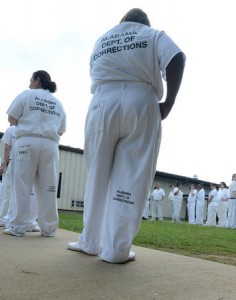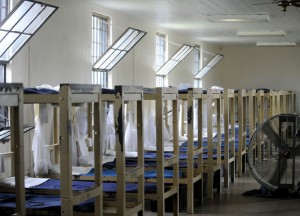By Casey Toner | ctoner@al.com
Email the author | Follow on Twitter
on November 12, 2014 at 6:15 AM, updated November 12, 2014 at 1:36 PM
Charging an inmate $125 for a 30-minute phone call to a family member, mixing in juvenile offenders into adult prisons, refusing to allow an elderly diabetic mother to visit her inmate daughter because her “breath smelled.”
These are some of the allegations the Montgomery-based Equal Justice Initiative leveled against the Alabama prison system in a report published on Tuesday.
Bryan Stevenson, Equal Justice Initative executive director, told AL.com that his organization issued the report to expose what he says are the lingering ills affecting the Alabama Department of Corrections.
“There is so little transparency and access for us, the media, and anyone else, so it’s easy for the (prison system) to say ‘We have done all of these things and things are getting better,’” Stevenson said. “Until there is evidence there, we cannot take it seriously.”
The ADOC, which received more than $365 million in general fund money last year, could achieve meaningful reforms with limited costs by replacing the wardens of the more troubled prisons and ensuring that juveniles stay out of state prisons, Stevenson said.
Previously, the EJI issued a report into sexual abuses at Julia Tutwiler Prison for Women that sparked a federal investigation into sexual abuse allegations.
They are also suing the Alabama Department of Corrections, claiming that poor leadership, inadequate security and unsafe conditions have caused inmate violence to spike at St. Clair Correctional Facility, which has had six homicides in the past 36 months. The ADOC has yet to formally respond to the lawsuit in court.
“These problems have been created by poor correctional staff management, non-compliance with departmental protocols and procedures, and corruption at the severely overcrowded facility,” the report states.
The EJI gave hundreds of reports, documents and files to the U.S. Department of Justice in the hope that they will expand their pending investigation of Tutwiler to address “illegal and unconstitutional conditions of confinement at several Alabama prisons,” according to the report.
An AL.com investigation revealed that St. Clair Warden Carter Davenport punched a handcuffed inmate in the head during a routine transport in 2012, an issue that is raised in the federal lawsuit. Davenport was suspended for two days in the matter, which the ADOC never investigated.
Stevenson, an attorney, told AL.com that neither the report nor the lawsuit is about making money. He says the EJI is losing money with the lawsuit and is not receiving any attorney fees.
“In four years of talking about prisons, we have filed one lawsuit,” Stevenson said. “We have never filed a lawsuit in (the Tutwiler cases) because we didn’t want to engage in litigation … If we were really interested in generating fees, we’d file 25 lawsuits for each person who got beat and we’re not doing it.”
The new EJI report makes reference of the sexual abuse allegations against Tutwiler as well as the incident when Davenport punched the handcuffed inmate in the head. It also makes shocking claims that there were nearly a dozen instances where inmates at Elmore Correctional Facility were handcuffed, stripped naked, and then beaten by officers.
Furthermore, male guards at Donaldson and Bibb Correctional Facilities forced young male inmates to perform sex acts, the report claims.
“We issued the report because we think that people need to know that these prisons are in very, very bad shape and there is a profound absence of leadership and immediate reform,” Stevenson said.
An Alabama Department of Corrections spokeswoman told AL.com on Tuesday that they could not comment since they had not yet read the report.
The EJI report also claims:
- The EJI investigated more than a dozen instances in which a correctional officer confiscated a cell phone without following protocol and then threatened disciplinary action against the inmate unless the prisoner or his family paid the officer several hundred dollars. In several instances officers sold confiscated contraband to other inmates. This widespread distribution of contraband by prison staff is policed by physical violence, leading to a dramatic rise in serious physical assaults, stabbings, and homicides in ADOC facilities during the past year.
- Karla Jones, former Tutwiler deputy warden, was promoted to warden at Easterling Correctional Facility. The EJI is receiving a wave of complaints about arbitrary new policies and procedures that it says have increased violence and tension at that facility. Records show Jones was suspended for three days in July 2002 while working as a correctional officer supervisor at the Birmingham Work Release Center. In that case, she reported that she couldn’t find an ounce of marijuana and $100 that had been seized from an inmate. Her boss threatened to call in ADOC investigators to search for it. Jones called two days later and said she had forgotten that the marijuana and cash were in her desk drawer.
- The Alabama Department of Corrections continues to house children prosecuted as adults in adult facilities where they face an increased risk of sexual assault and violence. Even though the number of offenders in state prison facilities under age 18 is small and these juveniles could be housed at appropriate detention facilities for juveniles, ADOC has refused to act.
- ADOC’s Investigations and Intelligence (“I & I”) unit does not conduct effective and reliable investigations of sexual misconduct by staff and other staff misconduct. The close relationship between I & I investigators and correctional staff make independent and reliable investigations very difficult. Additionally, DOC investigators have not consistently responded to or taken seriously complaints about sexual misconduct and abuse. EJI has interviewed male prisoners who report that investigators took months to respond to complaints about sexual misconduct.
- The ADOC no longer reports on the incidents of staff-on-inmate sexual misconduct or the use of excessive force in its annual reports to the legislature.
- Over the past decade, facilities across Alabama have implemented practices that make it increasingly difficult for families to communicate and maintain ties with incarcerated family members.
- Depending on the prison, a 30 minute phone call once a week could put a $125 or higher dent in the family’s monthly budget.
- One elderly mother was refused a visit with her daughter after having traveled two hours with her four grandchildren when the visitation officer told her that her breath smelled, so she was refused entry into the prison. The mother was diabetic and dehydrated from the long drive and wait in line at the facility, but she was not given the opportunity to explain that the odor was caused by her diabetes.
- Another mother, who was recovering from chemotherapy and visiting her son for the first time since her diagnosis with cancer, was confronted during her visit by three officers and ordered to enter a closet area where she was ordered to remove all of her clothing in front of the officers. When she asked what was happening the officers refused to respond to her questions. Nothing was found and she was allowed to return to her visit with no explanation.
- Numerous family members have reported that prison officials contacted them after a loved one died but they were given little if any information about the circumstances of the death. The siblings of an elderly female prisoner who had a stroke and was on a ventilator were not allowed to visit their sister while she was in the infirmary. Counsel was also denied visitation. Within one week, the inmate passed away.
- The parents of Rocrast Mack, who was beaten to death by correctional officers, were phoned by the prison chaplain after their son, who was badly beaten and unconscious, was transported by ambulance to Jackson Hospital in Montgomery. At the hospital, his father, Larry Mack, was forbidden from seeing his dying son, on orders of the warden. When the warden relented several hours later, Mack found his son’s room full of prison guards. “They wouldn’t let me touch him,” he recalled. “It was up to the warden.” His son died later the next day.







